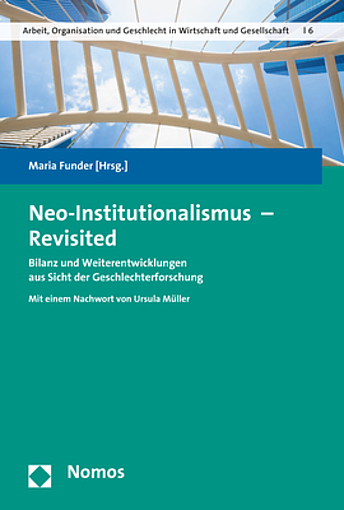englischBy now neo-institutionalism is a highly well received theoretical approach, being discussed intensely not only in organizational research, but also in gender studies. Its attractiveness as a source of inspiration for the analysis of organizations and gender can no longer be ignored. Consequently, it is about time to bring together and discuss those diverse efforts to enhance neo-institutionalist theory in combination with gender-related concepts.
This handbook offers a multi-disciplinary inventory, sounds out blind spots of neo-institutionalism regarding gender relations, and presents gender theory enhancements. The main focus is on the question of to what extent, if at all, gender studies can benefit from neo-institutionalist thoughts both theoretically and empirically which is not to say that connections to other theoretical approaches ought to be excluded. Among others, this work addresses the perspectives of world polity, institutional work, travelling ideas, processes of organizational change and degendering as well as the mechanisms of heteronormativity.
With contributions by:
Annette von Alemann, Nathalie Amstutz, Helga Eberherr, Maria Funder, Raimund Hasse, Katja Hericks, Stefanie Hiß, Johanna Hofbauer, Roswitha Hofmann, Ilona Horwath, Lisa Knoll, Katharina Kreissl, Rainhart Lang, Brigitte Liebig, Hannah Mormann, Ursula Müller, Sebastian Nagel, Julia Nentwich, Ursula Offenberger, Martina Peitz, Edeltraud Ranftl, Daniela Rastetter, Irma Rybnikova, Birgit Sauer, Hanna Schulte, Angelika Striedinger, Jeannette Trenkmann, Kristina Walden, Ralf Wetzel and Theresa Wobbe
Der Neo-Institutionalismus ist mittlerweile ein stark rezipierter Theoriestrang, der nicht nur in der Organisations- sondern auch in der Geschlechterforschung intensiv diskutiert wird. Die Attraktivität des Neo-Institutionalismus als Inspirationsquelle für die Analyse von Organisation und Geschlecht ist folglich nicht mehr zu übersehen. Es ist daher - wie wir meinen - an der Zeit, diese vielfältigen Anstrengungen zur Weiterentwicklung neo-institutionalistischer und genderorientierter Theoriekonzepte zusammenzubringen und zur Diskussion zu stellen.
Das Handbuch bietet eine multi-disziplinäre Bestandsaufnahme, lotet blinde Flecke des Neo-Institutionalismus aus und stellt theoretische Weiterentwicklungen und aktuelle Debatten im Zusammenhang von Organisation und Geschlecht vor. Im Fokus steht dabei vor allem die Frage, ob und inwiefern die Geschlechterforschung von neo-institutionalistischen Überlegungen theoretisch und empirisch profitieren kann, was Verknüpfungen mit anderen Theorieangeboten - angefangen von Bourdieu über Foucault bis hin zu Giddens und Boltanski - keineswegs ausschließt. Rekurriert wird in den Beiträgen auf recht unterschiedliche Denkschulen des neuen Institutionalismus, wie die World-Polity-Forschung, den diskursorientierten, skandinavischen Institutionalismus (z.B. das Konzept der Travelling Ideas) oder den organisationssoziologischen Neo-Institutionalismus, die jeweils aus einer Geschlechterperspektive reflektiert werden. Vor diesem Hintergrund wird in den Beiträgen auch nach Barrieren und Spielräumen für gleichstellungspolitische Aktivitäten in Profit- und Non-Profit-Organisationen (insbesondere in Unternehmen und Hochschulen) gefragt. Thematisiert werden u.a. Prozesse des organisationalen Wandels und Degenderings, Fragen der Entkopplung und Scheinheiligkeit von Organisationen, die Bedeutung von institutionellen Logiken, Geschlechterwissen und symbolischer Gewalt sowie Wirkweisen von Heteronormativität.
Mit Beiträgen von:
Annette von Alemann, Nathalie Amstutz, Helga Eberherr, Maria Funder, Raimund Hasse, Katja Hericks, Stefanie Hiß, Johanna Hofbauer, Roswitha Hofmann, Ilona Horwath, Lisa Knoll, Katharina Kreissl, Rainhart Lang, Brigitte Liebig, Hannah Mormann, Ursula Müller, Sebastian Nagel, Julia Nentwich, Ursula Offenberger, Martina Peitz, Edeltraud Ranftl, Daniela Rastetter, Irma Rybnikova, Birgit Sauer, Hanna Schulte, Angelika Striedinger, Jeannette Trenkmann, Kristina Walden, Ralf Wetzel und Theresa Wobbe


